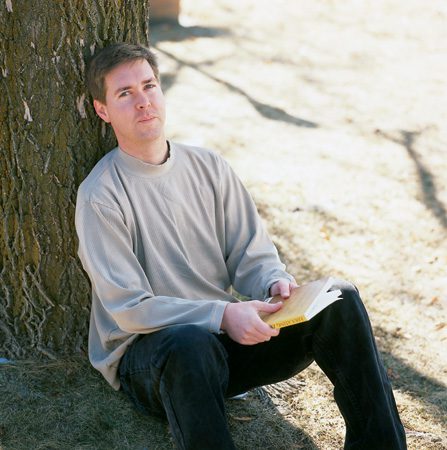By Jeff McClellan
Fred was a tank lumbering along the trail in front of me. His army-green poncho hung over his double-XL body, augmented by a backpack full of camping gear and five days’ trash. His fishing pole poked up antenna-like through the side of his poncho, and his boot treads churned beneath him through the mud.
Overhead, black clouds rumbled with laughter and hurled hailstones on my naked ears. An hour earlier, however, I had been Huck Finn on Lodgepole Lake. From our makeshift log raft, my companions and I dove into the water, whooped at the icy cold, and gazed at the then-harmless puffy clouds. It was a beautiful day for backpacking in Utah’s High Uintas wilderness, where seas of dark evergreens splash up against stark brown ridges and hide scores of small blue lakes.
But as I hiked out of the Uintas that afternoon, the trees and peaks and lakes were hidden from view by mud and rock. When we reached the top of the hill, the downpour ceased and we set out along the spongy edges of Grandaddy Lake. All around lay the remains of the hail, strewn among the yellow August grasses like wedding-day rice left behind on a sidewalk. The sun edged out, sending a slow mist drifting in front of an evergreen-covered island. The brown shale of East Grandaddy Mountain framed the green island, the shimmering lake, and the ghostly mist, and I relished the moment.
Fred and I were roommates at BYU, but our relationship began when we were 8 or 9 years old and we flung stones and insults at each other through the field that separated our backyards. A Cub Scout den brought us together, and our friendship for many years revolved around Scouting and mountains.
When I was about 15, our Scout troop took a backpacking trip into the Uintas. Busy with a summer job, I was unable to join Fred and the other Scouts, but I heard about it after. And I heard about it for the next 10 years.
Every year Fred would inject himself into the mountains, and every year Fred would try his hardest to get me to come. Generally, the maps would appear about December. When we were roommates, I would come home on winter days to find Fred at the kitchen table, poring over maps and jotting down itineraries.
“It’s a life-changing experience, Jeff,” he would say, citing evidence from the lives of our fellow Scouts. I remained unconvinced, daunted by academic pressures, financial demands, and camping anxieties.
In 1994, however, I graduated from BYU and gave in to Fred. I’ll never forget the view from Hades Pass as I entered the wilderness. The expanse of trees and ridges carried a power Fred’s five-picture panoramic never could muster. By the time I left the Uintas that weekend, hiking out through hail and mud, I was converted. I love the mountains. Often when I’m taking in a view, I feel an exultant need to grasp the mountain in my arms and squeeze it—to crush the rocks against my chest and smash the trees to my face. I experience the same sensation with the ocean or with animals, and I want to embrace the sea or wrestle the bear. It’s a need to be part of something living, something huge, something awe inspiring. It’s a curiosity, a drive to know and understand and feel and be.
There is something about life and creation—in most any form—that enthralls me. It feeds my soul.
But I resist. I find myself tethered to responsibilities or weighted by stresses, and it often takes persistent prodding to get me to untie the strings and empty the pockets and leave.
A few years ago a friend and I found ourselves in San Diego with nothing to do. So we went sailing. We rented a boat, received a 30-minute lesson, and began an afternoon tour that would lead each of us to eventually purchase a small sailboat.
I love sailing. I love the way the wind fills the sail and the boat lists to the side and the bow cuts through the water. I revel in the near silence and the freedom from motorized support. When I’m sailing, I am working with nature. I become part of creation.
But I don’t sail very often, for the same reasons Fred still struggles to get me into the mountains. It is, actually, more accurate to say that I love the idea of sailing.
Several months ago I became acquainted with Steve Morris, the advisor of BYU’s Sailing Club. Steve loves sailing. Really. And recently he has become my sailing Fred. Every few weeks Steve calls and invites me on a sailing trip. “Sorry, I’ve got too much to do,” I pine. Or, “I’d love to, but I’m a Scoutmaster and . . .”
One day in mid-April I returned to my office to find my phone-mail light flashing at me. As I listened to the message, I smiled. It was Steve. He was at the lake.
Amused at his persistence but aware of my deadlines, I deleted the message and turned to my computer, where one of the pressing tasks awaiting me, ironically, was to finish this article.
Excuse me. I need to go sailing.









